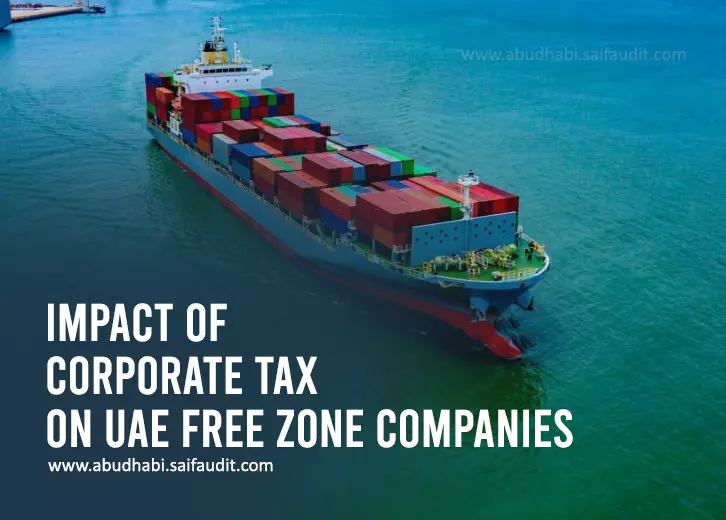
Saif Chartrered Accountants Abu Dhabi
July 24, 2023
Impact of Corporate Tax on UAE Free Zone Companies : The implementation of Corporate Tax (CT) in the United Arab Emirates (UAE) through Federal Decree Law No. 47 of 2022 has had significant repercussions on all businesses operating within the country.
This includes companies operating in the various Free Zones in the UAE, as they are now subject to the UAE Corporate Tax regime. These companies are required to register for CT, maintain proper books of accounts under International Financial Reporting Standards (IFRS) – mandatory for companies with an annual turnover exceeding AED 50 Million – or IFRS for Small and Medium-sized Enterprises (SMEs) – optional for companies with an annual turnover below AED 50 Million – and file their CT Return with the Federal Tax Authority (FTA) on an annual basis. However, the specific impact of the UAE Corporate Tax on different Free Zone companies will depend on the Free Zone they are incorporated in, their business activities, and their business model.
The UAE boasts more than 50 Free Zones, spread across its seven Emirates. Some Free Zones in the UAE have provisions in their Decrees or Charters that grant a Corporate Tax Holiday to companies engaged in Qualifying Business Activities, lasting for a period of 50 years. On the other hand, there are Free Zones in the UAE without any such provisions for a Corporate Tax Holiday.
As a result, the UAE’s Ministry of Finance (MOF) has identified the Free Zones with provisions for a Corporate Tax Holiday, making companies engaged in Qualifying Business Activities eligible for a 0% UAE Corporate Tax Benefit. This eligibility is outlined in Cabinet Decision (CD) No.55 of 2023 and Ministerial Decision (MD) No.139 of 2023, recently issued to address the applicability of CT to Free Zone companies. However, companies incorporated in Free Zones not notified by the MOF for the 0% Corporate Tax Benefit will be treated as regular companies (non-Free Zone Persons) and subject to the same Corporate Tax provisions as Mainland Companies in the UAE.
A Free Zone Person (FZP) refers to a legal entity incorporated, established, or registered in a Free Zone designated by the UAE’s Ministry of Finance as eligible for the 0% Corporate Tax Benefit for Qualifying Business Activities. Nonetheless, to become a Qualifying Free Zone Person (QFZP) under the UAE Corporate Tax Law, certain additional conditions must be met. These conditions include maintaining sufficient substance within the Notified Free Zone, generating Qualifying Income as specified in CD No.55 and MD No.139, avoiding Excluded Activities mentioned in MD No.139, not electing to be subject to CT at Standard CT Rates under Article 19 of the CT Decree-Law, and preparing and maintaining Audited Financial Statements according to MD No.82 of 2023.
A QFZP that fulfills the conditions stated in Article 18 of the CT Decree-Law and is subject to CT under Clause 2 of Article 3 will be subject to UAE CT at the following rates:
– 0% on Qualifying Income
– 9% on Taxable Income that is not Qualifying Income
Qualifying Income refers to income derived by a QFZP that is subject to the 0% CT Rate in accordance with CD No.55 and MD No.139. Only QFZPs earning Qualifying Income can benefit from the 0% CT Rate. Qualifying Income includes income derived from transactions with other FZPs (excluding income from Excluded Activities) and income from transactions with non-FZPs (including overseas customers) related to Qualifying Activities that are not Excluded Activities. Non-Qualifying Income, on the other hand, is income earned in a Tax Period from Excluded Activities or activities that do not fall under Qualifying Activities as specified in CD No.55 and MD No.139.
Qualifying Activities comprise the following:
– Manufacturing of Goods and Materials
– Processing of Goods and Materials
– Distribution of Goods or Materials in or from a Designated Zone to a customer involved in reselling those Goods or Materials
– Ownership, Management, and Operation of Ships
– Regulated Reinsurance Services
– Regulated Wealth and Investment Management Services
– Headquarter Services to Related Parties
– Treasury and Financing Services to Related Parties
– Regulated Fund Management Services
– Logistics Services
However, certain Excluded Activities are not considered Qualifying Activities. These include income derived from transactions with natural persons, income from certain regulated financial services and activities (e.g., banking services), income from intangible assets, and income from commercial immovable property located outside of notified Free Zones and other immovable property located within or outside notified Free Zones.
If an FZP earns income from ‘Excluded Activities’ or any other income that is not considered ‘Qualifying Income,’ it will lose eligibility for the 0% UAE Corporate Tax if such income exceeds the de minimis threshold. The de minimis threshold states that non-qualifying revenue earned by an FZP in a financial year must not exceed either 5% of their total revenue or AED 5 million, whichever is lower.
In the event that a QFZP fails to meet any of the conditions specified in CD No. 55 or MD No.139, it will cease to be considered a QFZP, as per the provisions of Article 18 of the CT Decree Law. This disqualification will be effective from the beginning of the relevant Tax Period and will continue for the subsequent four Tax Periods.